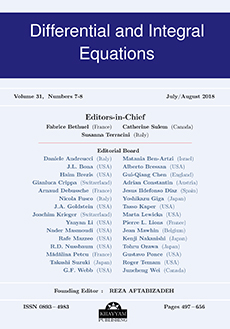Abstract
In this article we study the hyperbolic problem \begin{align*} & u_{tt} - \Delta u + F(x,t,u, \nabla u)= 0 \quad \mbox{in}\quad \Omega\times {\mathbb R}_+, \\ & u=0 \mbox{ on } \Gamma_0,\quad u +\int_0^t g(t-s) \frac {\partial u}{\partial \nu}(s) ds = 0 \mbox{ on } \Gamma_1 \times {\mathbb R}_+, \\ & u(x,0)=u^0 (x), \quad u'(x,0) = u^1 (x)\quad \mbox{in} \quad \Omega , \end{align*} where $\Omega$ is a bounded region in ${\mathbb R}^n$ whose boundary is partitioned into disjoint sets $\Gamma_0, \Gamma_1$. We prove that the dissipation given by the memory term is strong enough to assure stability of our system. The general decay estimates we obtain depend on the relaxation function. In particular, if the relaxation function decays exponentially (or polynomially), then the solution also decays exponentially (or polynomially) and with the same decay rate. Indeed, the main result of this paper is to give general relations between the decay of the solution and the decay of the relaxation function, under weaker hypotheses on the resolvent kernel function (defined in Section 2),and the potential functions $\phi (x)$ and $\varphi (t),$ which represent (in some sense) the linear and the nonlinear part of $F$ with respect to $\nabla u$, respectively. We assume only that $\varphi$ is bounded and small enough at $\infty$ which means that, in fact, $\varphi$ has no real influence on the stability of our system. In the case where the relaxation function decays exponentially or polynomially, we obtain the same decay for the solution, and then the results of [3,4] become just a particular case of ours. We also distinguish the case where the first data $u^0$ vanishes on $\Gamma_1$ and prove that, in this case, we have exponential or polynomial decay of solution, even if the relaxation function does not converge to 0 at $\infty$.
Citation
M. M. Cavalcanti. A. Guesmia. "General decay rates of solutions to a nonlinear wave equation with boundary condition of memory type." Differential Integral Equations 18 (5) 583 - 600, 2005. https://doi.org/10.57262/die/1356060186
Information





